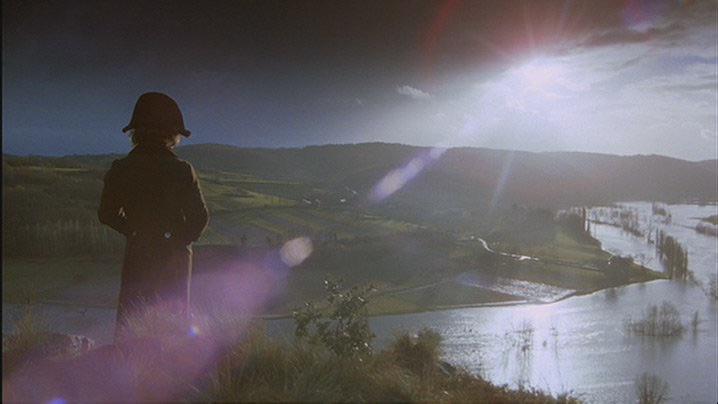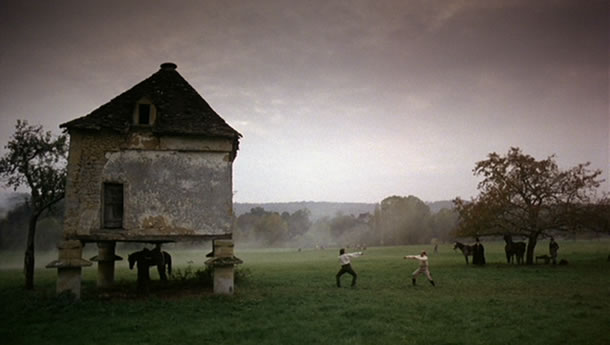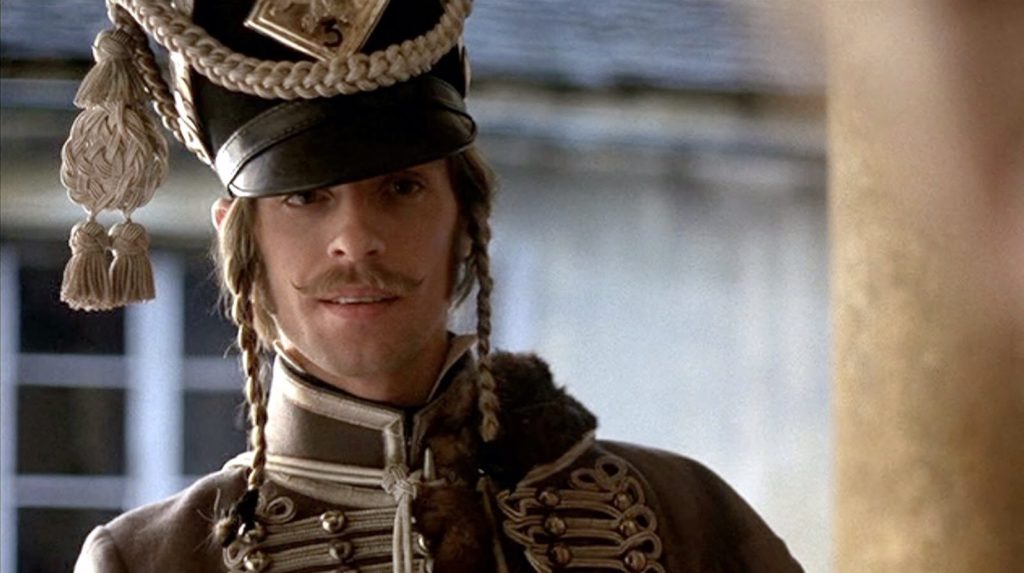|MH Rowe|

The Duellists plays at the Trylon Cinema from Sunday, March 24th, through Tuesday, March 26th. Visit trylon.org for tickets and more information.
Of course we’re supposed to condescend to the idea of a duel. To imagine two people—two men—agreeing to mortal combat with guns or swords over a breach of honor strikes the contemporary and perhaps cynical observer as so fussily absurd, so absurdly dramatic, and so male, that we might say it’s good for a dramatic setup in a story but not for anything high-minded. Duels seem to come from a time before, as the sociologists might say, the state monopoly on violence. But even in 19th century Russian novels, the victor sometimes has to skip town and live in exile if he kills another man in a duel. Not always, though; the circumstances vary, from Pushkin to Tolstoy to Chekhov. Apparently, there was a time when you could duel, kill, and live to duel again. Or, as in Ridley Scott’s debut feature, The Duellists (1977), you might duel the same man over and over for years—a duel that is really about what duels can mean rather thana specific violation of someone’s sense of honor.

The duel between Armand d’Hubert (Keith Carradine) and Gabriel Feraud (Harvey Keitel) begins in Strasbourg sometime in 1800, when d’Hubert brings Feraud a message from their military superiors. Like Feraud, d’Hubert is a lieutenant in Napoleon’s army. He’s been tasked with informing his fellow officer that he must remain under house arrest following a duel in which Feraud killed the nephew of the local mayor. Feraud, however, takes great offense, more to the messenger than the message. He accuses d’Hubert of being a “general’s poodle” for having “chosen to hunt me out in the drawing room of a lady to whom I feel the deepest”—but he can’t quite finish the sentence, his voice rising, as with the faintest smile, d’Hubert remarks, “Sir, I respect your inexpressible sentiments.” A particularly delightful line, for it further enrages Feraud, who cannot abide the idea of inexpression.
So, Feraud draws his sword. “I see no reason to fight,” says d’Hubert after telling Feraud to calm himself. Feraud only sneers. “What reason would you like?” he says. “Shall I spit in your face?” Like reasonable men, they repair to the garden to fight. D’Hubert fends off Feraud’s attack, cuts open his opponent’s wrist, and then leaves him unconscious to retrieve the doctor, before returning in relief to his regular duties.
For the rest of the film, which follows d’Hubert over the course of the next 16 years, Feraud will repeatedly challenge his opponent, wherever the convenience of rank permits (two officers of different rank cannot duel) and geographical distance will allow. In each case, one of them injures the other. All these duels nevertheless end in some sort of stalemate, short of a killing blow, only to be resumed in a different form in another place: Augsburg, Lübeck, Russia (the most tonally and visually distinctive passage in this painterly film), Tours, and finally Paris. Curiously, neither Feraud nor d’Hubert ever bothers to explain to anyone else why they are fighting. D’Hubert cannot even bring himself to tell his lover Laura (Diana Quick), and she recognizes the savagery of Feraud instantly. Then again, d’Hubert also balks at marrying Laura; he’s much too reasonable for love. But we viewers know the cause: It’s a duel over what—and if—men let themselves feel, a duel about the violence of tender feelings, a duel about the ultimate respectability of even petty human sentiments. A duel where the hero might be the despicable man.
Scott’s film, like the Joseph Conrad novella upon which it is based, suggests that Feraud is the passionate one and d’Hubert the man of reason. But d’Hubert is not really so reasonable. This is exactly Feraud’s point, more on which in a moment. First consider d’Hubert’s refusal to explain the duel. His hesitation belies his interest in the extended fight, which, as the end of the film suggests, he could have ended much earlier had he not felt drawn to its repetition as a demonstration of moral endurance. “The only way out is to go through with it,” he says. Moreover, d’Hubert feels as strong a sense of dignity as his foe. “Honor,” he is at pains to point out, “is indescribable, unchallengeable.” This honor constitutes a secret he keeps inviolate. The long-lived intimacy of Feraud and d’Hubert’s quarrel makes The Duellists feel like a fuzzy mirror image of Brokeback Mountain. They’re committed, they’re private, and they feel it more intensely than anything else.
Feraud is the key. In Conrad’s original novella, he declares, “I am perfectly reasonable!” This is paradoxically easy to believe. In Feraud there exists something tender and wounded alongside the belligerence. And d’Hubert’s objections—his injunctions to “calm yourself,” for example—come across as precious and irritating. Is d’Hubert so hidebound, so mindful of convention, so reasonable that he forgets that passion is often absurd and unfathomable, perhaps indescribable and unchallengeable? Feraud’s reasonableness lies in the fact that he would never let a sense of the rules conceal or trample his feelings. They are his feelings! He is perfectly reasonable!
If Feraud is the key, Keitel makes it turn. Along with his irrepressible Brooklyn accent, he brings to bear on Feraud all his instinctive hostility and ambiguous anger. His characters always seem to have in mind that there are unchangeable sides to things when others yearn for placid and automatic agreement. The distracting accent helps in this case. The feeling that perhaps Keitel has been slightly miscast and is unable to fully assume the role of a French hussar in Napoleon’s army suits his pugnacious character perfectly. It even gives it a metaphysical quality. After all, there’s something a little bit wrong with Feraud. The world doesn’t suit him.
![Harvey Keitel as Feraud stands next to two comrades, with a drawn sword.]](https://www.perisphere.org/wp-content/uploads/2024/03/Feraud-1.jpeg)
Though mostly excellent, The Duellists does not quite fulfill the promise of Keitel’s performance nor the premise of its story. No question the film looks great. Released two years after Stanley Kubrick’s Barry Lyndon, in which almost every shot feels like a painting, Scott manages some of the same splendor; he even cribs, to excellent effect, Kubrick’s characteristic zoom-outs. And the final cliff-top shot of The Duellists shows off a chastened but still world-striding Feraud, calling to mind not one but two paintings of Napoleon himself: Napoleon on Saint Helena and Napoleon Musing After Sunset at Waterloo.

It’s Carradine’s role that puts a kink in what the movie can do. Carradine himself seems suited to the part. His stiffness matches the stiffness of d’Hubert. His skinny physicality and slightly teenage ferocity suggest a man who has chosen discipline because he’d flail without it. The character turns out even in Conrad’s original story to be a bit of a sentimental portrait. Yet in the film, he doesn’t reach the same sentimental height of a man surprised by love, rising to the occasion of marriage. In the film it seems more mawkish. You also couldn’t really say of d’Hubert in the film, as Conrad writes, that he appears to be a man who has “the air of antique ghosts” after the end of the Napoleonic wars. Something under-imagined clings to the script that Carradine is reading from, and he cannot manage to pull from it what Keitel extracts.
If Keitel’s Feraud represents the heroism of unrestrained feeling, he’s also the villain with no sense of reality to check him. Defeated but not killed by the honorable d’Hubert—in an extended duel that resembles the cat-and-mouse dénouement of a film like Silence of the Lambs—Feraud ends up living as a “dead man.” He can no longer challenge the enemy who spared his life. He seems destined to wander, like an immortal from the Highlander films that The Duellists is said to have inspired. When, in the end, Feraud climbs a cliff over a bending river, wearing his Napoleon hat, sunlight flares in an angle across the middle of the screen. The fields below, on the other side of the water, grow streaky and striped with light. Feraud watches it all. To borrow a phrase from George Eliot, you can’t help but imagine what unuttered curse might be rising to his lips.
Edited by Finn Odum
